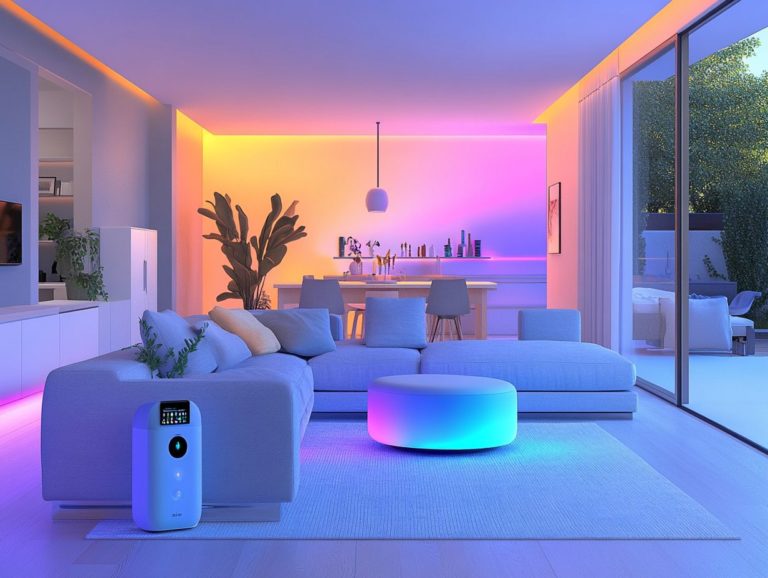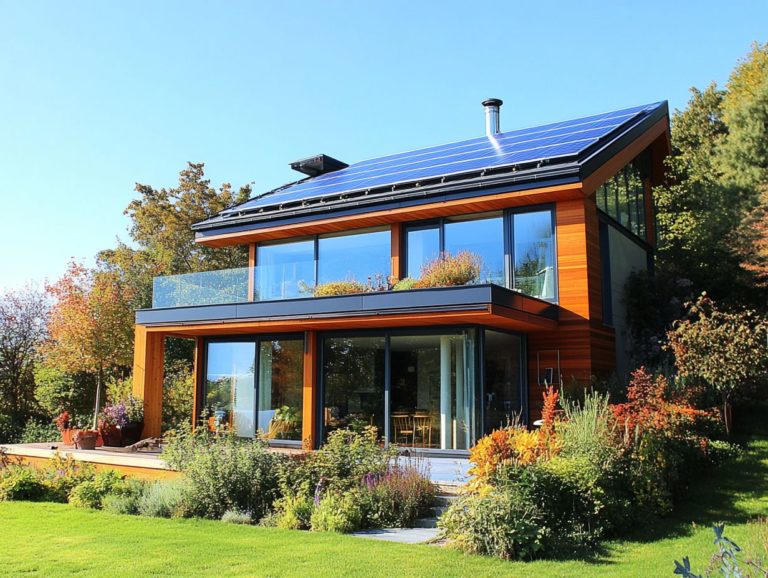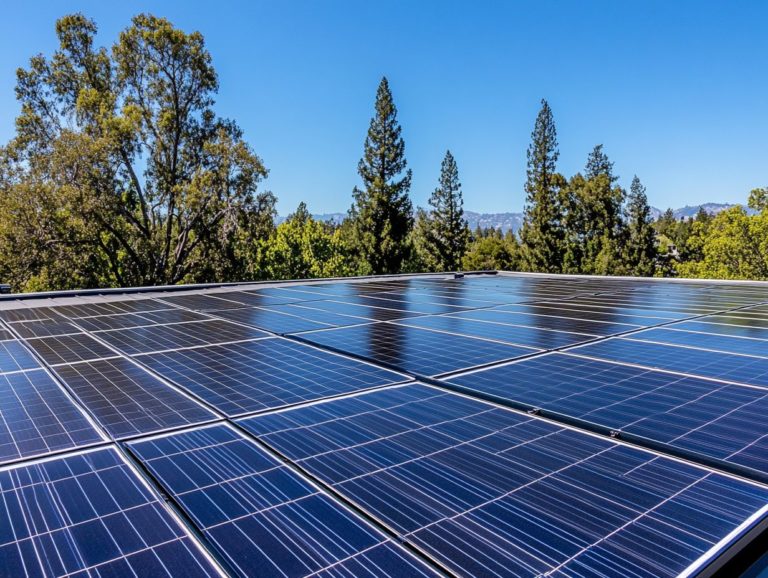How to Upgrade to Energy-Efficient Appliances?
Energy efficiency transcends mere jargon; it represents a strategic approach that can yield substantial savings while contributing to a healthier planet.
This article delves into the true meaning of energy efficiency. It outlines the advantages of upgrading to energy-efficient appliances and provides insights on evaluating your current devices.
You ll be guided through selecting the ideal energy-efficient options. You’ll uncover the financial incentives available for such upgrades and receive essential tips for installation and maintenance.
Prepare to discover how even minor adjustments can create a considerable impact!
Contents
- Key Takeaways:
- Understanding Energy Efficiency
- Assessing Your Current Appliances
- Choosing Energy-Efficient Appliances
- Financial Incentives for Upgrading
- Installation and Maintenance Tips
- Frequently Asked Questions
- What are energy-efficient appliances?
- Why should I upgrade to energy-efficient appliances?
- How do I determine if an appliance is energy-efficient?
- What are the most common types of energy-efficient appliances?
- How much can I save by upgrading to energy-efficient appliances?
- Are there any rebates or incentives for upgrading to energy-efficient appliances?
Key Takeaways:
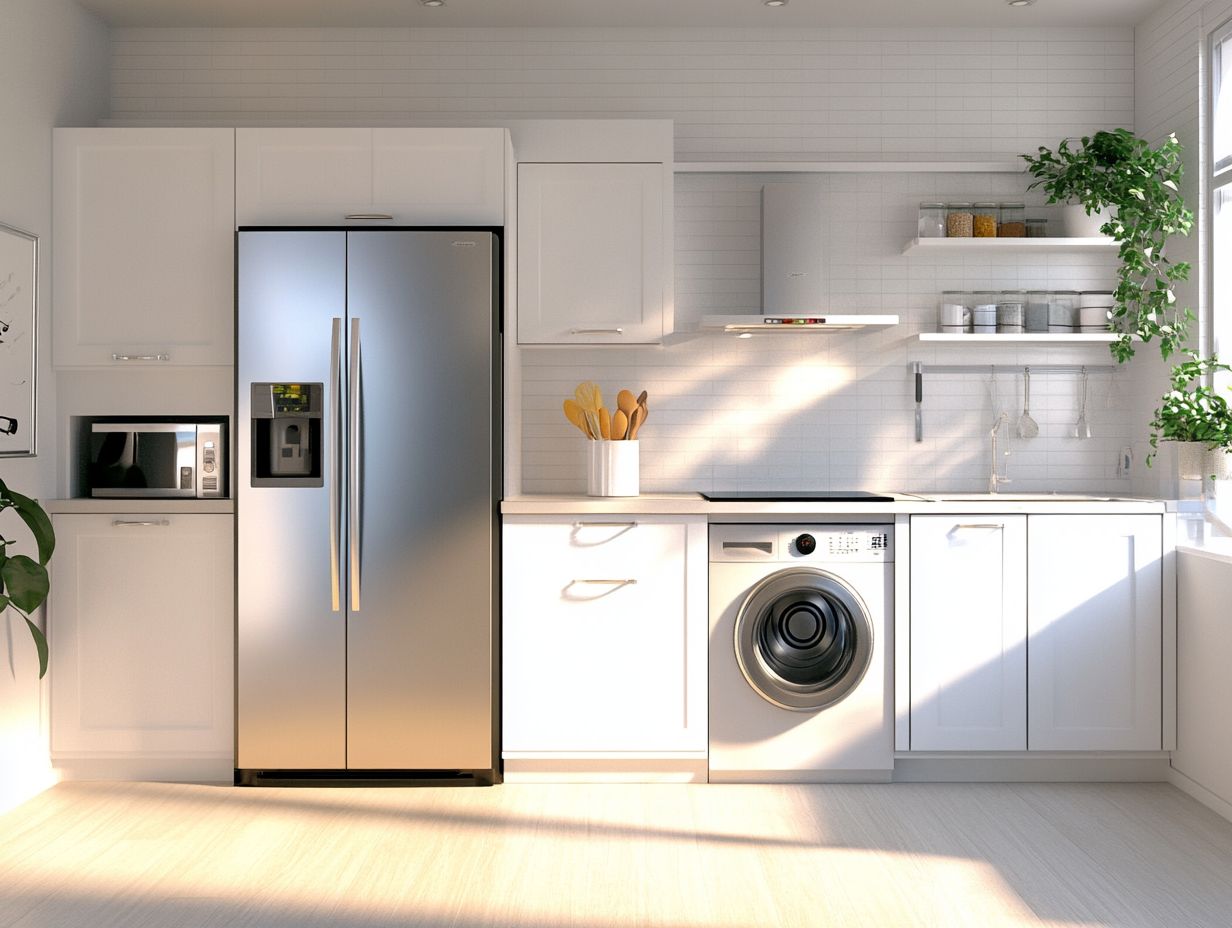
Understand the benefits of energy efficiency. Upgrading to energy-efficient appliances is important for both the environment and your wallet.
Evaluate your current appliances to identify which ones consume the most energy. Consider upgrading to more energy-efficient options for better cost-effectiveness.
Look for key features and energy ratings when choosing new appliances. Take advantage of financial incentives and proper installation tips to maximize efficiency and longevity.
Understanding Energy Efficiency
Understanding energy efficiency is essential for homeowners like you who want to save money and minimize energy consumption. It means using less energy to achieve the same level of comfort, such as heating and cooling, while benefiting the environment by reducing carbon emissions.
Prioritizing energy-efficient upgrades, such as ENERGY STAR certified appliances, enhances your home’s eco-friendliness. For more information, check out the long-term benefits of energy-efficient appliances. You can also access various rebates and financial incentives for sustainable practices.
What is Energy Efficiency?
Energy efficiency means using less energy to achieve the same results or maintain a comparable level of comfort. This practice is crucial for reducing overall energy consumption and championing sustainability.
By optimizing your energy use, whether at home or in a business setting, you can significantly reduce your utility bills while also minimizing your environmental impact.
The EnergyGuide label serves as an invaluable resource. It enables you to gauge how much energy a product is likely to consume over the course of a year, allowing for easy comparisons among different models.
Embracing energy-efficient measures can lead to a reduction in energy consumption by an impressive 10-50%! Imagine cutting your energy use by this amount! That’s a huge impact you can make today.
When you opt for ENERGY STAR certified products, you’re choosing items that meet rigorous energy efficiency standards established by the U.S. Environmental Protection Agency. These products promise enhanced performance and reliability while contributing positively to reducing greenhouse gas emissions.
Why Upgrade to Energy-Efficient Appliances?
Upgrading to energy-efficient appliances can lead to notable savings on your utility bills. To further enhance your home, consider learning how to upgrade to a smart energy-efficient home. These appliances are designed to consume less energy while maintaining top-notch performance, making them an economical choice for many households.
The switch to these modern wonders not only curtails your environmental footprint but also fosters sustainability in your everyday life. By selecting models with ENERGY STAR ratings, you can easily pinpoint which appliances offer optimal efficiency and longevity.
Many states and utility companies offer financial incentives, such as rebates or tax credits, that sweeten the deal on these upgrades.
As time goes on, the lower energy consumption translates into significant reductions in your overall household costs. Making informed choices about your appliances is not just a savvy financial move; it s also a commitment to responsible resource use.
Assessing Your Current Appliances
Evaluating your current appliances is an essential step in grasping their energy consumption. This assessment allows you to pinpoint which appliances might require replacement or upgrading.
By doing so, you can fully leverage the financial incentives available for energy efficiency upgrades. This leads to a more eco-friendly home and significantly reduced utility bills, enhancing both your savings and your environmental impact.
Start your assessment today and take the first step toward savings and sustainability!
Evaluating Energy Consumption
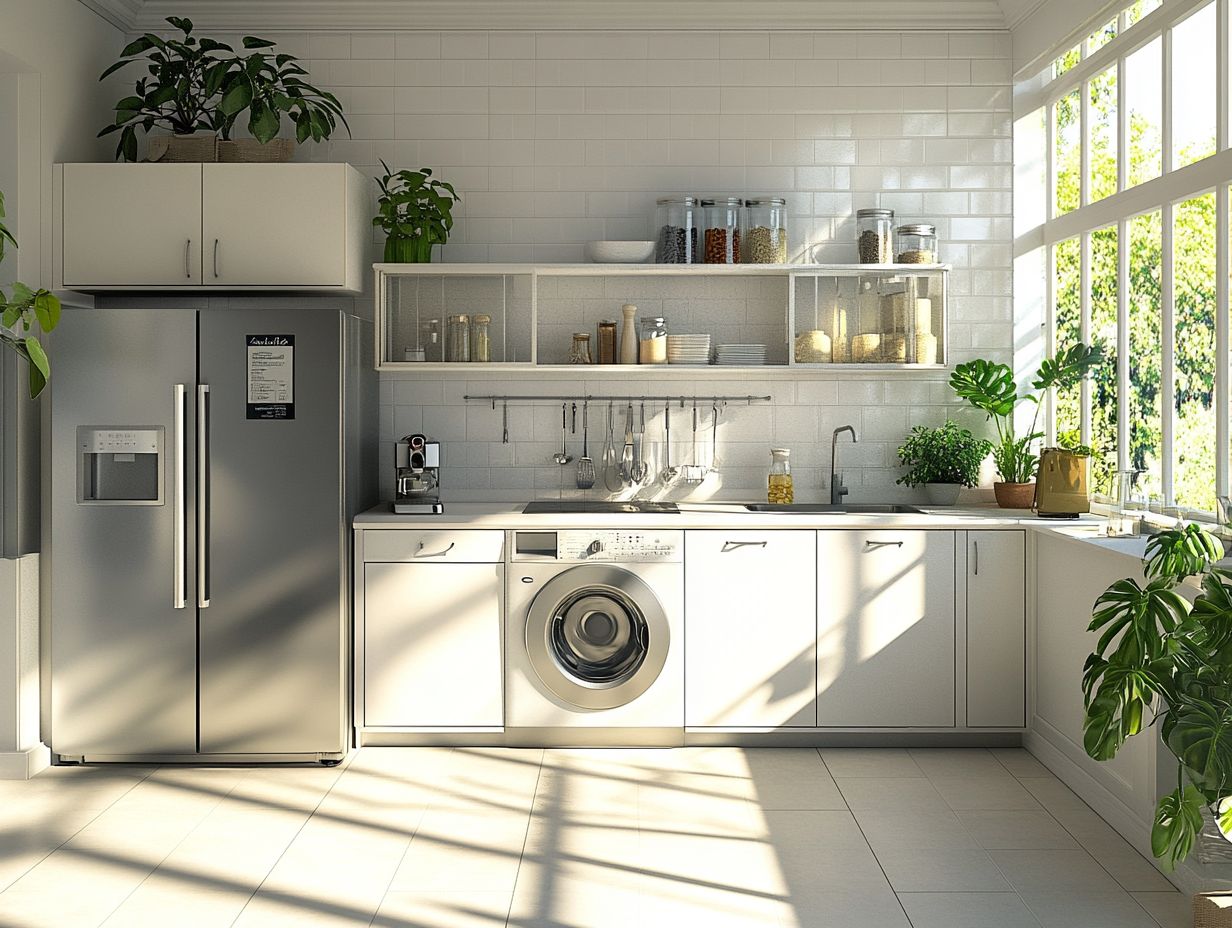
Evaluating energy consumption in your home means diving into the specifics of how much energy your appliances and systems actually use. A home energy auditor can be your best ally in this endeavor.
These professionals bring their tools and expertise to the table, finding energy waste that might be slipping under your radar. This makes it far simpler for you to take actionable steps toward superior energy management.
Utilizing the EnergyGuide label, which shows how much energy an appliance uses compared to similar models, is another invaluable strategy. It offers clear insights into energy usage, steering your choices toward greater efficiency.
Monitoring electricity usage with smart meters can unveil patterns and highlight spikes that might otherwise go unnoticed. By regularly assessing your energy consumption habits and aligning them with established energy efficiency standards, you can craft a sustainable plan that effectively reduces your overall energy footprint.
Identifying Inefficient Appliances
Identifying inefficient appliances in your home is crucial for making savvy decisions about energy-efficient upgrades. Older appliances tend to consume more energy and often come with higher repair costs. For practical tips for energy-efficient appliance use, transitioning to new, ENERGY STAR certified models is a smart choice.
To effectively pinpoint which appliances are underperforming, consider a few important factors. The age of an appliance is a significant indicator; those over ten years old are likely to be lagging in efficiency.
Watch your energy consumption patterns. If certain appliances frequently spike in usage, it s a clear sign of inefficiency. Don t overlook the costs associated with repairs. If these expenses are piling up, it may be time to retire that outdated machine.
Transitioning to energy-efficient models not only slashes your utility bills over time but also makes a positive impact on the environment.
Choosing Energy-Efficient Appliances
When selecting energy-efficient appliances, it’s thrilling to discover the key features that truly make a difference.
Look for the ENERGY STAR certification a mark that signifies the product meets rigorous energy efficiency standards established by the EPA. Use energy ratings to compare various options and make an informed decision.
Key Features to Look For
When you’re on the hunt for energy-efficient appliances, key features to keep in mind include ENERGY STAR certification. This badge of honor guarantees that the appliance meets rigorous energy efficiency standards.
Consider smart technology integration, as it can further optimize energy usage for your home. Along with these qualifications, take a close look at specific energy consumption ratings and the overall design of the appliance.
Understanding how an appliance aligns with local energy guidelines can give you valuable insights into its long-term savings potential. Features like programmable settings can elevate your automation game, enabling you to sync energy consumption with off-peak utility rates.
Together, these attributes not only pave the way for significant savings on your utility bills but also foster a healthier home environment by minimizing unnecessary energy use. Ultimately, making informed choices in your appliance selections can yield both economic advantages and environmental benefits.
Comparing Energy Ratings
When selecting appliances, comparing energy ratings is essential. Metrics like the Energy Efficiency Rating (EER) and Seasonal Energy Efficiency Rating (SEER) offer valuable insights into how much energy an appliance consumes relative to its performance.
By understanding these ratings, you can make informed decisions that not only save you money on utility bills but also support environmental sustainability.
EER typically measures the efficiency of cooling appliances, such as air conditioners, under specific conditions, while SEER provides a more comprehensive view of performance throughout an entire cooling season.
By considering these metrics, you can pinpoint which products will operate more effectively and cost-efficiently over time. This knowledge gives you the power to invest wisely in appliances that minimize your energy footprint, ensuring both financial savings and a reduced impact on the planet.
Financial Incentives for Upgrading
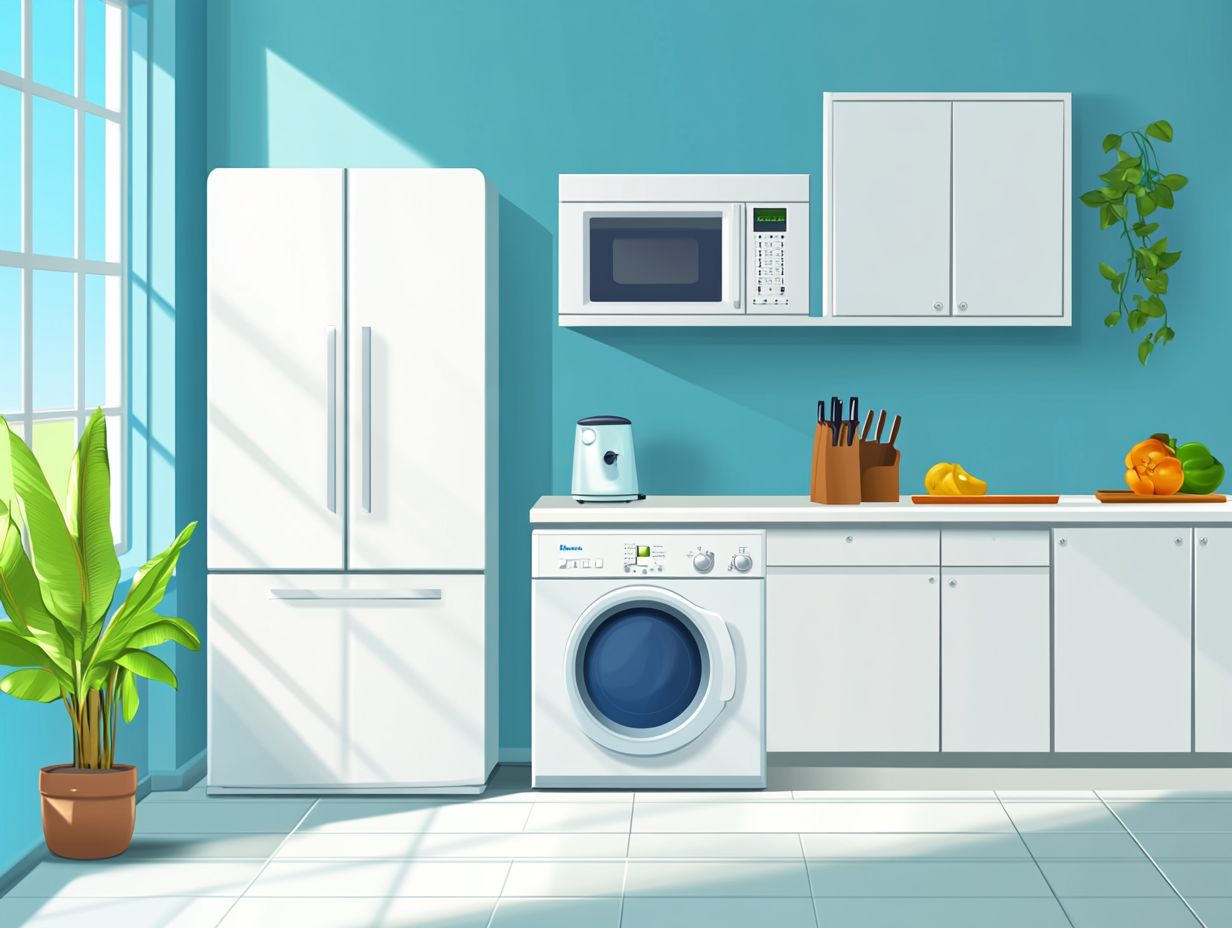
Financial incentives for upgrading to energy-efficient appliances can significantly lower your costs. To maximize savings, check out top tips for maintaining energy-efficient appliances. Tax credits, rebates, and utility programs make energy efficiency upgrades both eco-friendly and budget-friendly.
Embracing these upgrades can transform your energy consumption and make a meaningful impact on your budget.
Tax Credits and Rebates
Tax credits and rebates are great financial incentives designed to help you offset the initial costs of upgrading to energy-efficient appliances. You can enjoy big savings while making eco-friendly choices that benefit both your wallet and the planet.
These incentives come in many forms, catering to a wide array of energy-efficient appliances, from refrigerators and washing machines to heating systems and solar panels.
For example, federal tax credits may offer you a percentage back for purchasing a qualifying appliance, while local utility companies might provide rebates that directly reduce those upfront costs.
If you decide to upgrade to an ENERGY STAR-certified refrigerator, you could receive a rebate that significantly lowers your expense. This illustrates how these programs contribute to environmental well-being while alleviating the financial strain of making smarter choices for your home.
Financing Options
Exploring various financing options is crucial for homeowners eager to invest in energy efficiency upgrades. A wealth of programs is available to support residential clean energy initiatives, making these improvements more accessible than ever.
These financing options can lighten the financial load associated with upgrades, offering everything from low-interest loans and grants to tailored payment plans for energy-efficient appliances. Many municipalities provide rebate programs that serve as additional incentives to embrace sustainable solutions.
Explore innovative financing solutions like Property Assessed Clean Energy (PACE) financing, which allows you to cover installation costs through property taxes, making it much easier to manage your expenses over time. By leveraging these resources, you can elevate your living space, lower long-term utility costs, and contribute to a greener environment.
Installation and Maintenance Tips
Proper installation and regular maintenance are essential to ensure your energy-efficient appliances operate at peak performance.
By prioritizing these practices, you can maximize energy savings and extend the lifespan of your valuable investments.
Proper Installation for Maximum Efficiency
Proper installation of energy-efficient appliances, especially HVAC systems, is crucial for achieving peak efficiency and ensuring that the unit operates as it should. This maximizes your energy savings and overall performance.
When HVAC systems are installed correctly, they effortlessly regulate indoor temperatures and enhance air quality, leading to improved comfort in any space you occupy. On the flip side, improper installation can cause a range of issues, including diminished efficiency, skyrocketing energy bills, and frequent breakdowns.
Common pitfalls often involve:
- Size the unit correctly
- Create effective ductwork connections
- Neglect proper sealing and insulation
To sidestep these potential headaches, invest the time to choose qualified professionals who adhere to industry standards. Take a close look at your specific needs and ensure that every component is installed and tested with precision before you put it to use.
Upgrading to energy-efficient appliances can save you money and protect the planet. Take advantage of these incentives and make informed choices today!
Maintenance Tips for Longevity
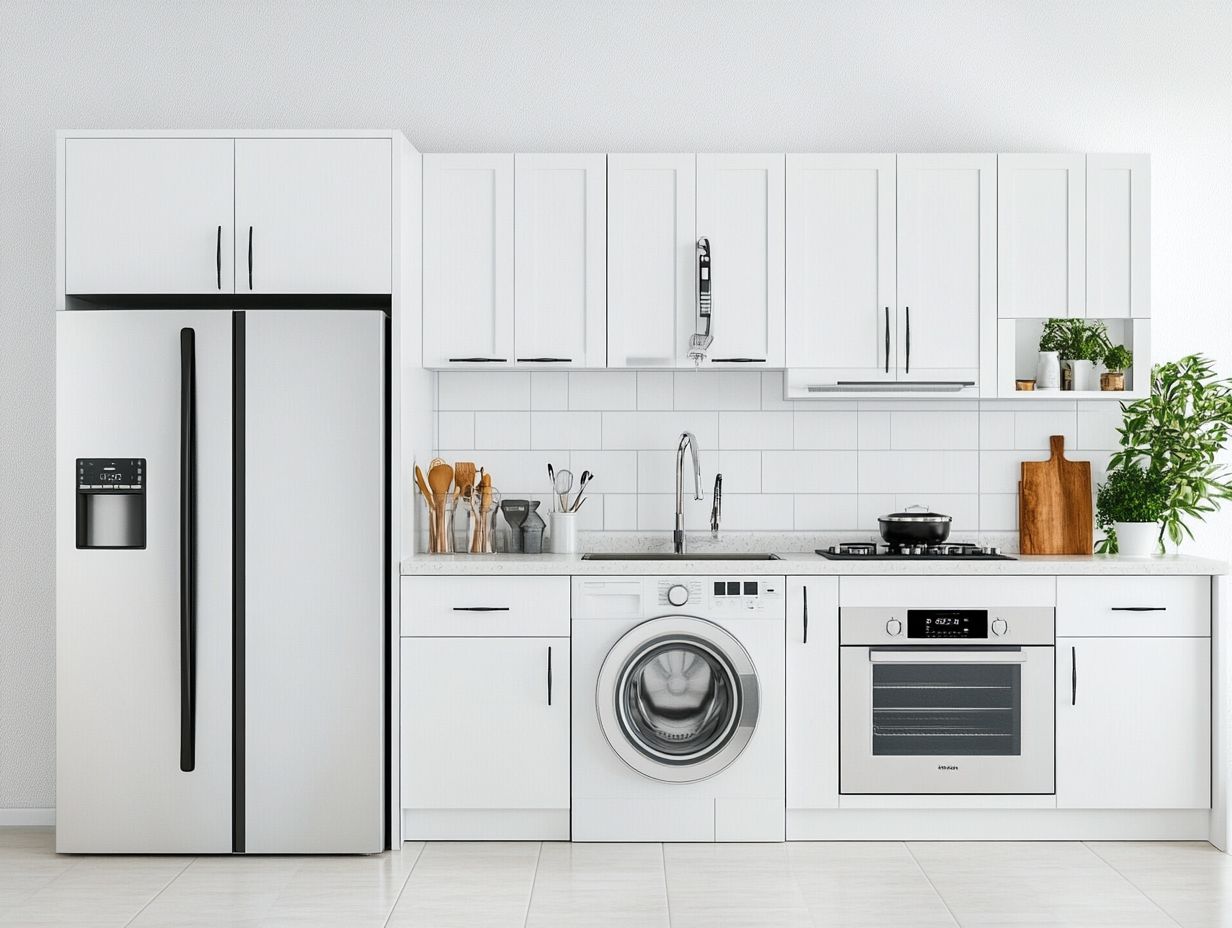
Regular maintenance is essential for extending the lifespan of your energy-efficient appliances. It ensures they perform at their best.
This practice also reduces the chances of facing costly repairs down the line.
By spending a little time on regular check-ups, you can enjoy enhanced efficiency that translates into lower energy bills. Simple actions like cleaning or replacing filters, checking seals, and keeping coils dust-free can prevent unnecessary strain on your appliances.
Regular inspections can reveal potential issues before they escalate, ultimately providing you with a greater return on your investment. When your appliances are in peak condition, they not only work more effectively but also consume less energy.
Don’t miss out on the benefits maintenance is crucial for peak performance!
Frequently Asked Questions
What are energy-efficient appliances?
Energy-efficient appliances are electronic devices that use less energy to perform the same tasks as standard appliances. They are designed to reduce the amount of electricity or gas used in a household, resulting in lower utility bills and less impact on the environment.
Why should I upgrade to energy-efficient appliances?
Upgrading to top energy-efficient home appliances can save you money in the long run by reducing your utility bills. They also have a lower impact on the environment, as they use less energy and emit fewer greenhouse gases.
How do I determine if an appliance is energy-efficient?
You can determine if an appliance is energy-efficient by looking for the ENERGY STAR label. This label is given to appliances that meet or exceed energy efficiency guidelines set by the U.S. Environmental Protection Agency and the Department of Energy.
What are the most common types of energy-efficient appliances?
The most common types of energy-efficient appliances include refrigerators, washing machines, dishwashers, air conditioners, and light bulbs. These appliances are used daily and can make a significant impact on your energy usage and utility bills.
How much can I save by upgrading to energy-efficient appliances?
The amount you can save by upgrading to energy-efficient appliances will vary depending on the specific appliances you choose and your current energy usage. However, on average, households can save hundreds of dollars per year by making the switch, especially when considering the best time to buy energy-efficient appliances.
Are there any rebates or incentives for upgrading to energy-efficient appliances?
Yes, there are often rebates and incentives available for purchasing energy-efficient appliances. These can vary by location and appliance type, so it’s worth researching what is available in your area. Some utility companies offer rebates or discounts for energy-efficient appliances.
Take charge of your energy savings today by maintaining your appliances!

